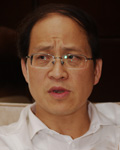|
 |
|
Zhang Yunling (ZHOU YOUMA) | According to Zhang Yunling, a researcher with the Chinese Academy of Social Sciences, the cost of China being the world's factory is high consumption of resources and severe pollution. "We exported a large amount of clean products to the world, but we're left with all the murky water and dirty air at home."
 |
|
Ning Chongrui (DUAN WEI) |
Ning Chongrui, chief architect of Lanzhou Engineering and Research Institute of Nonferrous Metallurgy Co. Ltd. in Gansu Province, said that China should change the current economic development model in view of the severe damage it has brought to the environment and climate.
Zhang Jiyao, former Director of the State Council South-to-North Water Diversion Office, said that excess production capacity, unreasonable energy infrastructure and highly energy-consuming lifestyles are the main reasons for smoggy weather.
"We have paid a high price for ignoring environmental protection during economic development," Zhang said. "Now we should pay great attention to sustainable development."
"The pollution in east China is much more severe than in the west, which also reflects the imbalance in the country's economic development," said Zhang.
"We have chosen the industrialization road of the West, and our lifestyle is also unconsciously influenced by materialism, which eventually bring a great environmental burden," said Zhang Yunling. "We need to regain the Chinese tradition of thrift."
He, also a member of the Chinese Peasants and Workers Democratic Party, calls as well for green lifestyles. "For instance, over-packaged and disposable goods are a major waste of resources at a big cost to the environment," he said, adding promoting resources recycling is the right and efficient way for environmental protection and sustainable development.
Most CPPCC National Committee members agree that environmental legislation is another important basis for abating pollution and building a beautiful country.
He said, "Promoting ecological progress needs institutional guarantees. Though China has enacted a series of laws and regulations concerning environmental protection, their guiding principles are relatively lagging and lack operability. To keep up with social progress, the laws and regulations should be revised."
Sun proposes a quicker action in legislating underground water protection. In the meantime, he said that the government should increase investment in water-quality monitoring and release relevant data regularly. "Those enterprises and individuals that pollute water sources should be punished in strict accordance with the law," Sun said, adding calls for revision of the law on air quality protection as well.
This year, Shi Jie, Vice President of Sichuan Province Lawyers Association, submitted proposals calling for revision of environmental protection laws, particularly those relating to air and water. He hopes that the revision of those laws could impose harsher penalties on enterprises and individuals damaging the environment.
Gao claims that to a great extent, current environmental problems are related to an irrational industrial structure. "As the current development model of China relies too much on land resources, damage to the environment is inevitable," Gao said. "To change the situation, high-grade and advanced technologies are needed to increase productivity per unit of land. When most of the land is left for nature, the environment will become much better."
 |
|
Liu Zhibiao (CFP) | Liu Zhibiao, President of the Jiangsu Provincial Academy of Social Sciences, echoed Gao's remarks. "To resolve environmental problems at the source, China should further advance its level of development and readjust the economic structure," he said.
Liu suggests that China should implement an economic globalization strategy based on boosting domestic demand. Taking advantage of this, the country can siphon worldwide high-class production factors to advance its industrial level and develop an innovation-driven economy. From there, China can build a modern industrial system dominated by hi-tech and emerging strategic industries, and a healthier industrial structure dominated by a modern service industry.
Zhang Jiyao said that China should be determined to shut down highly polluting and energy-consuming enterprises and those with excess production capacity or no ability for structural transformation.
"Education in rural areas is also a key factor for building a beautiful country," said Gao, who is also a member of China Zhi Gong Party. "On one hand, education helps villagers enhance environmental awareness," Gao said, adding that improving rural education is also one of the important bases for industrial restructuring.
Shi calls for greater public participation in building a beautiful country. "The government should attract and absorb more non-governmental organizations and individuals to join in the environmental protection campaign," Shi said.
The lawyer claims that China should strive to develop environment-friendly public goods, paying particular attention to speeding up the development of rail transportation and electric buses, which are carbon-conserving.
 |
|
Huang Youyi (ZHOU YOUMA) | Huang Youyi, Vice President and editor in chief of the China International Publishing Group, advocates international exchanges and learning from the valuable experiences of other countries as China strives to build a beautiful country. "There are many effective measures for the country to learn from foreign countries that have completed industrialization," Huang said.
"The Chinese Government has established many binding targets in energy conservation and emissions reduction, and have made notable progress in achieving the targets," Huang added. "But as China is still in the rapid development stage of industrialization and urbanization, it is impossible for emissions to decrease immediately."
| 